Latest News Archive
Please select Category, Year, and then Month to display items
20 August 2025
|
Story Dr Annelize Oosthuizen
|
Photo Supplied
 Dr Annelize Oosthuizen, Subject Head of Taxation in the School of Accountancy, University of the Free State.
Dr Annelize Oosthuizen, Subject Head of Taxation in the School of Accountancy, University of the Free State.
With the two-pot retirement system having been effective from 1 September 2024, it is important to demystify certain aspects to prevent an unpleasant surprise when you retire. Although there are other complex rules, this article was simplified and does not deal with exceptions. It also does not deal with members of a provident fund who were 55 years of age or older on 1 March 2021. Furthermore, reference to retirement funds is to a pension fund, provident fund or a retirement annuity fund (a discussion on preservation funds is therefore excluded).
Three, not two pots
Firstly, there are effectively three pots and not two.
- The first pot is referred to as the vested component. You will only have this component if you were a member of a retirement fund prior to 1 September 2024. This component consists of the member’s interest (balance) in the retirement fund on 31 August 2024 (the day before the implementation of the two-pot system) after being reduced with the amount of the seed capital that was transferred to the savings pot (see below). This seed capital amount was calculated as the lesser of 10% of the value of the member’s interest in the fund on 31 August 2024 or R30 000. No further contributions will be allocated to this component from 1 September 2024. Upon retirement, one-third of the funds in this component can be taken in the form of a lump sum. The balance will be transferred to the retirement component below and will be paid out in the form of monthly annuities.
- The second pot is the savings component. The opening balance of the savings component is the seed capital that was transferred from the vested component above. Thereafter, from 1 September 2024, one third of your monthly contributions to the retirement fund are allocated to this component.
- The third pot is the retirement component. From 1 September 2024, two-thirds of your monthly contributions to the retirement fund are allocated to this component. The funds in this component can only be accessed upon retirement (i.e. after reaching your retirement age, which is stipulated in the fund rules). Furthermore, upon retirement, the money in this pot is only paid out in the form of monthly annuities (i.e. monthly pensions) and no lump sum can be taken from this pot unless its total value is R165 000 or less.
Withdrawals are taxed unfavourably
Secondly, withdrawing from the savings component before retirement has adverse tax implications.
- From 1 September 2024 onwards, one is allowed to make an annual withdrawal (minimum of R2 000) from the savings component even if you have not yet reached your retirement age and although you are still employed. It is, however, important to remember that such withdrawals are taxed very unfavourably since they are taxed by using the normal progressive tax tables that apply to your other income such as salary. If you wait for your retirement and only withdraw from this savings component upon retirement, the first R550 000 will be tax-free and withdrawals above R550 000 will be taxed at rates much lower than the current progressive tax rates applicable to other income.
- Upon retirement, only the money in the savings component is allowed to be taken as a lump sum. If you therefore withdraw all the money from this pot annually prior to retirement, you will not have any funds available to access as a lump sum on retirement and will only have access to the monthly annuities payable from your retirement component.
Less funds available
Lastly, for those members who have a vested component (i.e. who became members of the retirement fund before 1 September 2024), the old rules still apply to the funds in that component. Therefore, upon retirement, you will still be able to take one third of the value of your vested component as a lump sum. The balance will be transferred to the retirement pot and will be paid out in the form of monthly annuities.
To summarise, even though it might appear lucrative to withdraw from your savings component annually, it is advised that you refrain from doing it unless you really need the funds to fulfill basic needs. Withdrawing prior to retirement has the following adverse consequences:
- Money withdrawn from the savings component is taxed at higher rates than what would have applied had you reached your retirement age and retired. You will therefore not make use of the R550 000 tax-free option.
- You will have less funds available to pay out as a lump sum on retirement. As a simple calculation, had you not withdrawn R30 000 in a single year, conservatively calculated at a rate of 5%, this R30 000 would have grown to R79 599 (R139 829 if a rate of 8% is used) calculated over 20 years that can be withdrawn tax-free when utilising the R550 000 tax-free portion on retirement.
UFS Winter Graduation Ceremony
2012-06-18
UFS awards record number of master’s degrees and doctorates
The University of the Free State (UFS) celebrated an increase in postgraduate successes with a record number of master’s degrees and doctorates that were awarded during the winter graduation ceremony at the Bloemfontein campus on Thursday 14 June 2012.
A total of 481 master’s degrees and 82 doctorates were awarded in two ceremonies in the Callie Human Centre on the Bloemfontein Campus. This is the most postgraduate qualifications to be awarded at a single graduation ceremony.
DiMTEC has reason to celebrate
|
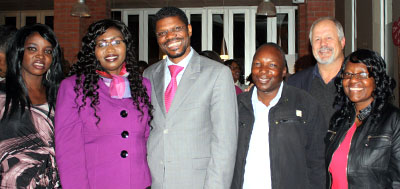 |
Dr Andries Jordaan (second from right) with some of the people who received their master's degrees. From the left are Kehinde Balogun, the couple Olive Chisola-Darris en Clement West Darris, and the couple Everson Ndlovu en Patience Sibongile Ndlovu.
Photo: Leatitia Pienaar
18 June 2012 |
|
DiMTEC had reason to celebrate at the winter graduation ceremony. The Disaster Management Training and Education Centre for Africa delivered a healthy crop of 32 master’s degrees and one doctorate.
This was the most master’s degrees that the centre has been awarded at one opportunity. The doctorate, however, was not at DiMTEC – Andries Jordaan, the director of the centre, obtained his Ph.D. in Agricultural Economy.
It was also the first time that two couples received their master’s degrees at the centre at the same time.
Speaking at the event, Dr Jordaan said former students of the centre were using their expertise worldwide. Some of them are in senior positions at the United Nations, in African countries, Afghanistan, and elsewhere. DiMTEC’s students hail from 17 African countries, including French-speaking countries.
“I am proud that we have a footprint right across Africa,” he said.
|
|
Three travel all the way from Europe for their MBAs
|
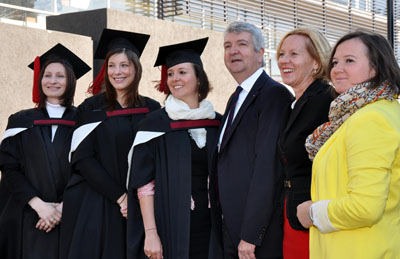 |
Smiles on an important day. From the left are: Kasina Baker, Friederike Hackelberg, and Johanna Kössler and her parents and sister.
Photo: Stephen Collett
18 June 2012 |
No distance, time or money could prevent three MBA graduates from Europe from attending the winter graduation ceremony in Bloemfontein. Two of them were exchange students who were so captivated by the university and the country that they undertook their MBA studies at the Business School.
Friederike Hackelberg of Bremen, Germany, was an exchange student in 2008 and extended her stay to do an MBA. Johanna Kössler of Bolzano, Italy, was also an exchange student who succumbed to the charms of the UFS and South Africa. She brought her parents, George and Nannie, and her sister, Magdalena, with her to attend the graduation ceremony.
Kasina Baker of Warsaw, Poland, began her studies while her husband was working in Kenya. She wanted to study at a quality institution and thus chose the UFS's Business School. |
|
Jessica gets three prestigious medals
|
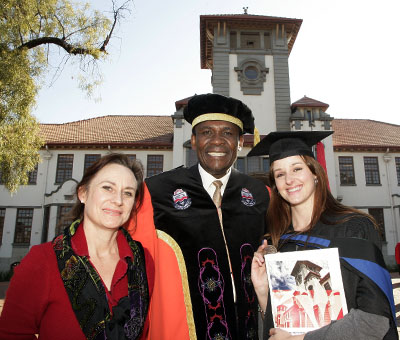 |
Jessica Potgieter (right) was the first student in almost three decades to receive three prestigious medals at the Winter Graduation Ceremony. She received the Dean's medal as best Master's student in the Faculty of Natural and Agricultural Sciences, the Senate Medal as best Master's student at the university and the Award for Scientific Achievement by the South African Association for the Advancement of Science. She is seen here with her mother, Mrs Ilse van Rhyn, and Dr Khotso Mokhele, Chancellor.
Photo: Johan Roux
18 June 2012 |
|
| Three daughters, three degrees for proud Kovsie mom |
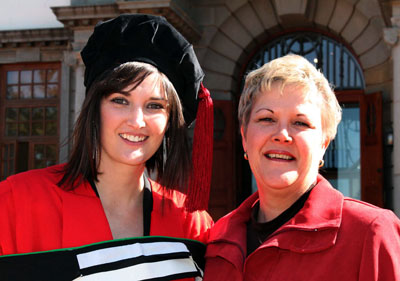 |
Liezel Alsemgeest and Adri Kotzé.
Photo: Leonie Bolleurs
18 June 2012 |
|
Adri Kotzé, Faculty Manager in the Faculty of Law, is a very proud parent. In the course of one year, all three her daughters will receive degrees from the University of the Free State (UFS). First in line is the eldest, who received her Ph.D. in Business Management at the Winter Graduation Ceremony.
Liezel is a lecturer in the Department of Business Management at the UFS, where she lectures, publishes and hopes to further her research in finance. “I enjoy working at the university because you have the freedom to do your own thing and focus on whatever you like,” she says.
The title of Liezel’s thesis is Customers’ perception of business units within an agricultural business in South Africa. Her focus is on the subjects of customer satisfaction and financial management, with a specific focus on the management of agricultural businesses.
Middle sister Corné will be graduating with a master’s degree in Occupational Therapy in December, while the youngest, Adéle, will receive her B.A. in Media Studies and Journalism at the Autumn Graduation Ceremony in 2013.
“I am very proud of all three my daughters,” says Adri.
|
|
| Sasolburg minister receives Dean's Medal for best master's degree in Theology |
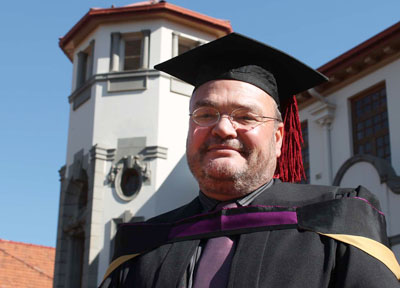 |
Rev. Frans Redelinghuys.
18 June 2012 |
|
Rev. Frans Redelinghuys of the Reformed Church in Sasolburg received his master’s degree in Theology at the University of the Free State’s Winter Graduation Ceremony. Rev. Redelinghuys was also awarded the Dean’s Medal as the best master’s degree student in the Faculty of Theology.
The focus of his dissertation is Spirituality. “My lecturers are all people who practice what they preach and they have shared their knowledge with me.,” he says.
“My studies also contributed to my personal development,” says Rev. Redelinghuys.
|
|
Student from the Netherlands receives degree at UFS Winter Graduation Ceremony
|
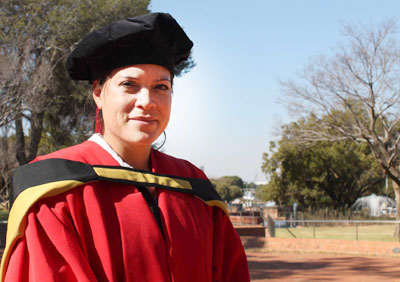 |
Deborah Van den Bosch-Heij.
Photo: Leonie Bolleurs
18 June 2012 |
|
Deborah Van den Bosch-Heij from the Netherlands was awarded a Ph.D. at the Winter Graduation Ceremony by the Faculty of Theology of the University of the Free State (UFS). Her thesis, Spirit and healing in Africa: A reformed pneumatological perspective, is an interdisciplinary investigation of the relationship between the Holy Spirit and healing in Southern Africa. The research addresses the need for a reviewed and contextually reformed approached to healing.
Deborah started her career as a minister at the Valkenburg Congregation of the Protestant Church in the Netherlands in 2001. She was appointed by the missionary department of her church to lecture at the Justo Mwale Theological University College in Lusaka, Zambia in 2005. It was here that she decided on the topic of her thesis. Prof. Rian Venter from the Department of Systematic Theology at the UFS, who is also involved at the Justo Mwale College, is Deborah’s promoter and assisted her in her studies whilst she was in the Netherlands. It was also Prof. Venter who made Deborah aware of the importance of interdisciplinary research.
|
|
Well-known judge's granddaughter receives degree
|
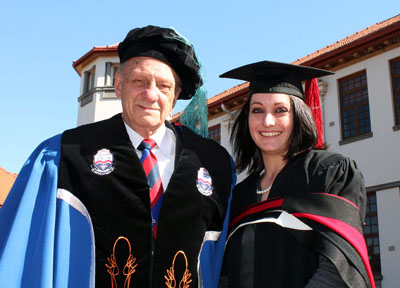 |
|
Judge Joos Hefer and Annelie de Man.
Photo: Leonie Bolleurs
|
|
Annelie de Man, a law researcher at the Supreme Court of Appeal in Bloemfontein received her master’s degree at the Winter Graduation Ceremony of the University of the Free State (UFS). She is Judge Joos Hefer’s granddaughter. Annelie was also awarded the Dean’s Medal as the best master’s degree student in the Faculty of Law.
“Today is one of the biggest highlights in my career,” says Annelie, who received exposure to the field of law from a young age.
In September, she will be leaving for Italy to study for a master’s degree in European Human Rights at the European Inter University.
|
|